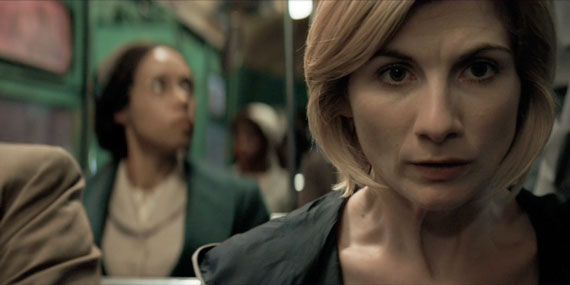I’m going to talk about It Takes You Away, so in principle, the article contains spoilers if, for some reason, you haven’t watched it yet.
…
So, the Doctor, halfway through, goes into a detailed discussion about the Solitract. She explains that one of her seven grandmas used to tell her stories about it and expands on the genesis of the entity and the situation forced upon it.
As a plotline for a show, this might seems a little strange—it feels like the Doctor makes a bit of a leap in reaching the conclusion that the Solitract could be the source of this problem. However, there have been stranger leaps of faith before… (the combined belief of a planet reversing the aging process of a Timelord, anyone?)
What I found interesting, from the perspective of a Gamemaster, was that this recollection and exposition about the Solitract felt like a “Hang on, I have an idea!” Story Point expenditure in Doctor Who: Adventures in Time and Space. A big spend. It’s the sort of spend where you make a leap and maybe the player creates something that explains everything and turns the plotline on its head. It feels like maybe even the Gamemaster didn’t have an answer—or if they did, they weren’t committed to it so strongly that they’re unwilling to let the players change it.
On that level, it feels really organic and rather nice.
Cookie Dough
So, you have this mixture. Sweet and tasty, with a generous scattering of chocolate chips. You’re not committed to making small cookies, big cookies, or maybe something else—you just know you have something tasty. And then someone rolls up and suggests cookie dough ice cream or, heck, freeze the dough for another time because they’re got doughnuts fresh from the bakery.
That’s what this feels like… (sort of)
It’s the sort of game where the GM has the start and finish in mind, but hasn’t nailed everything down. A tasty dessert in mind—cookies; and everyone should come away happy.
The start is a spooky house in the woods with a girl inside scared of a monster and certain that it took her father away. The end is the girl and her father being reunited—nothing more than that; that’s the end game here, the reunion. The existence of a specific threat probably has crossed the GM’s mind, but not necessarily the specifics beyond a rough outline.
It could be cookies, but it doesn’t have to be… It could be a crafty alien merchant stealing people out of other dimensions to rob them and feed them to his local predator… Couldn’t it?
Indeed, Ribbon and the interstitial void with the moths feel like they could have been the answer for the disappearances, but later—once the player characters pass through the cave, find the other side and the Solitracts makes an appearance—the GM redefines the role of the void and Ribbon; it almost becomes an afterthought.
(It sort of feels that way in the show, like the writer needed something to sit between the two houses but wasn’t really solid on the idea of what and why.)
Hook. Close. Improvise the Rest.
Sort of. That’s a lot to ask.
Certainly, it works that way with convention games for me. I have a hook, a way to start the game; I also have some actors and a couple of encounters in mind. The rest… Well, we shall see what happens and figure it out on the fly.
It’s why I recommend reading, viewing and listening to more Who, because how the variables arrive and work within the confines of the story can be educational if you break it down.
You have to be comfortable with it—letting the players come up with something totally new and off the wall is a big ask—but, part of the deal should be that everyone contributes to the success of the story. Perhaps, next time, you will need to haggle or bargain the players down because you have an idea that’s really cool and you don’t want to lose it. That’s OK—it should be fun for you too, and that means some of the prep should find a conclusion.
But, if you keep the prep light and fluffy, willing to improvise, it won’t hurt so much when the players derail it all.



